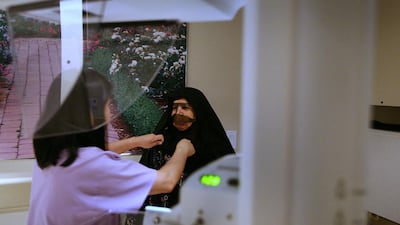ABU DHABI // Breast cancer is no longer the most deadly cancer in the emirate, with better treatments and detection rates improving patients’ chances of survival.
Health Authority Abu Dhabi on Sunday released statistics that stated breast cancer death rates had declined from 8.7 per 100,000 women in 2009 to 5 per 100,000 last year.
The incidences of late detection in stages three and four of the disease also fell, from 64 per cent in 2009 to 16 per cent in 2013.
Dr Norbert Dreier, consultant oncologist at Burjeel Hospital, said although the number of cases of breast cancer had not declined, treatment and detection had improved.
“The cancer cases in the Middle East are going to go up in the next decade because of our demographics and change of eating habits and lifestyle,” said Dr Dreier, a German who has lived in the country for 11 years. “But we hope to see death rates continue to go down because the diseases can be cured.
“The death rate is already going down because we are catching the cases earlier.”
He said cultural changes were part of the reason for the decline, with women becoming less embarrassed about going for tests.
“Old ladies used to hide the fact that they had breast cancer but this is not common now,” he said.
“The risk gets higher with age but informing the young people in the population as well as the elderly is important.”
Haad statistics revealed that last year, females accounted for 45 per cent of all cancer-related deaths, with breast cancer being the third most common cancer-related deaths for both genders, behind lung and blood cancers.
The statistics also revealed that the youngest person diagnosed for breast cancer was 25 years old while the average age for diagnosis was 49.4 years.
The majority of cases, 78 per cent, were recorded among those who are 40 and above.
Lorna Sayago, 57, from the Philippines, is a breast cancer survivor. She was diagnosed during a health check in 2009.
She regrets not getting tested until she was 50.
“It was my mistake that I didn’t start getting check-ups earlier, even though my cousin died of breast cancer and my mother had colon cancer,” Ms Sayago said.
“The campaigns around breast cancer help create awareness and I see that my colleagues get mammograms done as soon as they feel there is a problem.”
She said the length of sick leave given to breast cancer patients is still a problem, however, and said longer allowances for absences could improve recovery rates.
“I got only 15 days of sick leave with pay,” she said.
“The first few days of chemotherapy you can’t work and I extended my sick leave so they deducted a lot of money from my salary.
“Employers should give consideration and let patients adjust to the chemotherapy.”
Dr Fareeda Jahangir, specialist obstetrician at Danat Al Emarat, said many more women were now asking for mammograms and examinations than in previous years.
“In October, they could get mammograms for free, so a lot of women came then, even if they would not otherwise,” Dr Jahangir said.
A mammogram usually costs between Dh300 to Dh500 at other times of year.
Dr Hananh Yahi, consultant obstetrician and gynaecologist at Brightpoint Royal Women’s Hospital, said she was pleased to see that patients were coming by themselves for check-ups even though they did not have symptoms.
“People should have regular reminders,” she said.
arizvi2@thenational.ae


